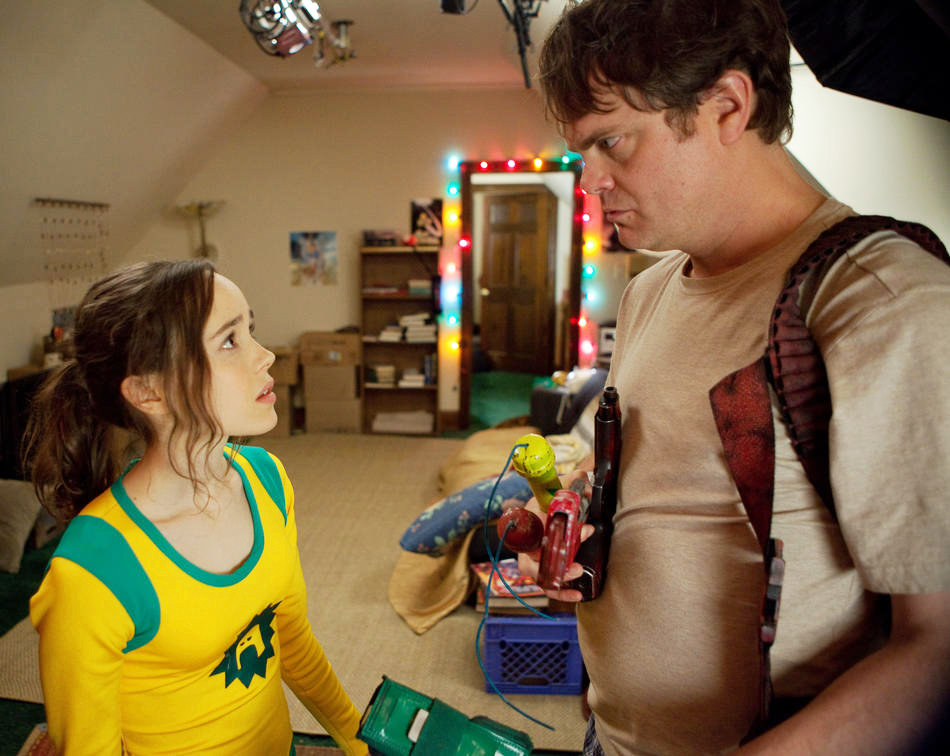One of the best “Super” hero films ever!
With “Guardians of the
Galaxy” raking in cosmological cash, no doubt aficionados of this film will
seek out the earlier works of writer/director James Gunn. They will likely be surprised to discover that Gunn
only has two previous directing credits to his name, and those two tiny films
stand in stark contrast to his recent big budget mega-success. While “Slither” managed to develop a devoted
following on home video, “Super” failed at the box office. It then quickly vanished into obscurity upon
DVD release, a real shame since “Super” is one of the best superhero movies
I’ve ever seen.
The frenzied opening animated sequence is a jubilant musical montage, and all the characters are introduced dancing to the power pop of "Calling All Destroyers" by Tsar. Despite the euphoric atmosphere, the lyrics of the song and the gut-splattered cartoon mayhem allude to the amoral oblivion that awaits. There is a cost to be paid for revenge, and it is painful and lasting. “Super” has everything
a comic book movie for adults should have:
it’s absurd, psychotic, and very
dark. The sexual fetishism of cosplay,
the crushing pall of mundanity and succeeding delusions of grandeur are all mixed together
into a roiling concoction that is whimsical yet harrowing. “Super” perfectly balances the childhood
fantasy of righteous vengeance against the often tragic repercussions of those
actions in the real world.
Frank Darbo is a short-order
cook who only has two good memories; his marriage to Sarah, and once showing a cop
where to pursue a purse snatcher. Crayon
drawings of these moments hang on Frank’s bedroom wall for daily inspiration. However, Frank's wife Sarah is a recovering addict, and while Frank has enjoyed their tranquil domestic
life, Sarah’s boredom causes her to become seduced and once again hooked on drugs by
Jacques, a sleazy strip club owner.
Frank vows to get Sarah back, but gets pummeled for his
efforts. After watching a cheesily
sanctimonious TV show on the All-Jesus Network, Frank has a dream. He sees a
mask. Frank fashions a bright red
costume and embarks on a holy crusade against crime.
As the Crimson Bolt, Frank’s
attempts to right the wrongs of the world within reach of his brandished
crescent wrench quickly devolve into the aberrant rages of a bludgeoning
lunatic. Anyone who butts in line at the
theater is clearly an asshole, but do they deserve to have their forehead split
open? Yet this is not the worst impact that
Frank’s bone-crunching judgments have.
Libby, a young comic shop employee whom Frank comes to for
“research” sees through Frank’s masquerade and she begs to be his sidekick. Libby’s infatuation with superheroes is
soon revealed to be so violent that she doesn’t care who gets hurt or whether they’re guilty. Even Frank cannot condone Libby’s indiscriminate bloodlust.
What sets “Super” apart from almost all other comic book-style films is its examination of the real devastation wrought from attempting to exact justice according to your own set of rules. Though Frank was bullied as a kid, in the guise of the Crimson Bolt he becomes someone whose physical assaults far exceed the psychological shame suffered in childhood. Frank’s brutal path of retaliation results in physical scars that will never fade, and he also incites further suffering by allowing Libby to trick him into beating those who have not done anything wrong. While “Super” does not have any answers, it percussively and hilariously documents the consequences of taking up arms against a sea of troubles that cannot be plumbed with merely a crescent wrench.







No comments:
Post a Comment